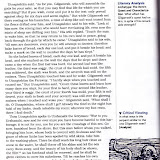Reading Survey
1. If you had to guess…
How many books would you say there are in your house? _____
How many books would you say you’ve read in the last twelve months? _____
2. How did you learn to read?
3. Why do people read? List as many reasons as you can think of.
4. What does someone have to do or know in order to be a good reader?
5. What kinds of books do you like to read? Why?
6. How do you decide which books you’ll read? How do you find these books?
7. Who are your favorite authors? (List as many as you’d like.)
8. Have you ever reread a book? _____ If so, can you name it/them here?
9. How often do you read at home?
10. When you are asked to read something for school (like a chapter in a book or a
packet of information), where and when do you usually read it? Why?
Getting To Know Yourself as a Reader
1. How long can you read at one sitting? What do you have to do to make it longer?
2. What do you have to do to remember what you read?
3. What kind of place can you study in?
4. What do you need to do while reading to help yourself make sense of what you read?
5. If you write while you read, what kinds of written signs do you use to help yourself understand
what you read? (Color codes? Stars? Underlining? Arrows?)
6. What do you have to do when you are sleepy while you are studying?
7. What kinds of reading are easy for you? What kinds are hard?
8. Do you read differently for one subject than another? If so, how is it different?
9. What are the best times for you to read?
10. What else do you know about yourself as a reader?
 Here is a fun and intelligent. website that contains some thought-provoking stuff about Oedipus and some other long-dead Greeks.
Here is a fun and intelligent. website that contains some thought-provoking stuff about Oedipus and some other long-dead Greeks.










